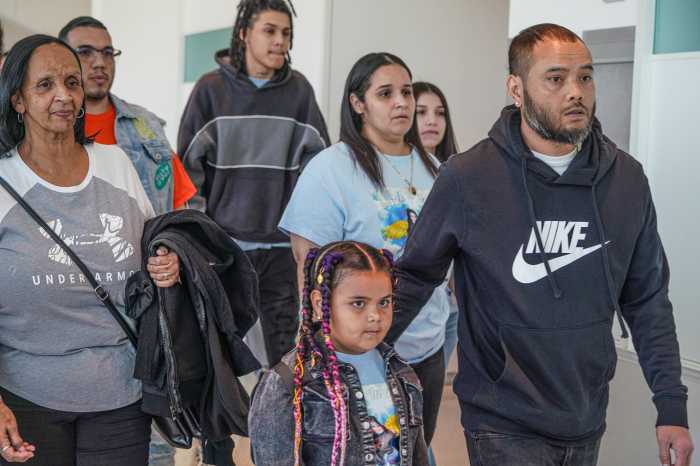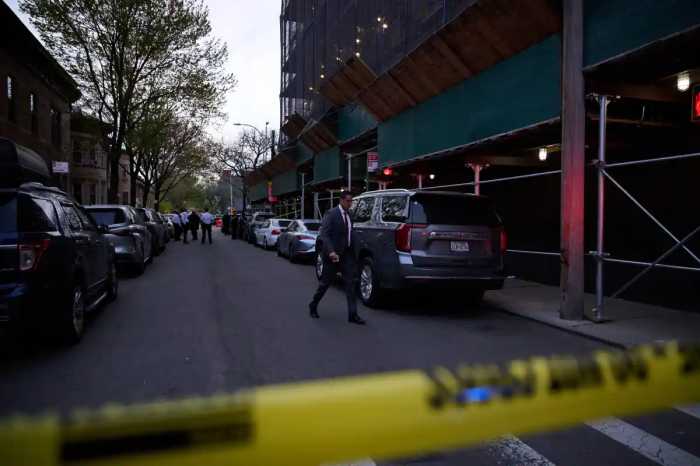Amandeep Singh was driving at 95 mph on the wrong side of a Syosset road on May 3, 2023, when he struck a car carrying four Roslyn teenagers returning from a restaurant following a varsity tennis victory over an arch-rival.
Singh’s blood alcohol measured 0.15 four hours after his arrest – well over the legal limit. Cocaine would also be found in his system.
Drew Hassenbein and Ethan Falkowitz, both 14, were killed in the crash. The other two teens were treated for internal injuries but survived.
Singh, a Roslyn resident, pleaded guilty on Jan. 3 to charges including aggravated vehicular homicide and driving while intoxicated. He was later sentenced to 8 1/3 to 25 years in prison.
Under a New York State law written in 1847, the families of the two injured teens can file a civil suit against Singh to recover damages for economic loss. In this case, the families of the two injured teens could sue for medical expenses.
But the families of the two high school teen tennis standouts who died – Drew Hassenbein and Ethan Falkowitz – cannot.
The reason is that New York’s 175-year-old law does not permit recoverable damages to include non-economic losses, such as emotional anguish, loss of companionship or grief.
This is wrong as Gary Falkowitz, Ethan’s father, vividly explained in a letter to Schneps Media LI.
“Losing a loved one isn’t just about losing their paycheck,” Falkowitz said. “It’s about losing their laughter, love and future moments together. Forty-eight out of 50 states in the United States ensure that grieving families have a path for justice. But not New York.”
Falkowitz, a personal injury attorney and East Hills Village prosecutor, is championing the Grieving Families Act, a legislative proposal aimed at reforming the state’s wrongful death statute,
The proposed act seeks to expand the scope of recoverable damages to include non-economic losses, such as emotional anguish, loss of companionship and grief, as it broadens the category of beneficiaries eligible to file wrongful death claims and extends the statute of limitations for such actions.
To be sure, this legislation would apply well beyond the cases of Drew Hassenbein and Ethan Falkowitz. But that does not make it any less needed, at least in some cases.
The legislation passed both the state Senate and Assembly with bipartisan support over the past three years but was vetoed by Gov. Kathy Hochul in each case, most recently on Dec. 21, 2024.
In her veto messages, Hochul expressed concerns that the legislation could lead to increased insurance premiums, higher healthcare costs, and potential negative impacts on small businesses and the state’s healthcare system.
She has been joined by business associations and healthcare industry representatives, who have said the expanded liability could result in significant financial burdens, potentially leading to increased consumer costs and challenges in retaining medical professionals within the state.
They stress the importance of balancing compassionate legal reforms with the economic realities faced by various sectors.
Proponents of the act, led by the New York State Trial Lawyers Association, argue that the current wrongful death law disproportionately affects groups such as children, seniors, women and people of color, whose economic losses may be minimal but whose emotional losses are profound.
Gary Falkowitz again offered a clear picture of this pain.
“I’ve cried every day since May 3, 2023,” Falkowitz said, referring to the date of his son’s death. “My life was broken that night. My son Ethan was just 14 years old when a drunk driver took his life. Ethan was full of kindness, joy, ambition, love and happiness. His future was stolen in an instant. And yet, under New York’s outdated law, Ethan’s life is considered to have absolutely no value, and the deep pain my family feels is completely ignored.”
The legislation opponents’ concerns about the unintended consequences seem reasonable.
But the opponents have had more than enough time to address their concerns, and the possibility of “significant liability” or increased insurance premiums is not enough of an excuse to reject the legislation. In some cases, significant liability is warranted both for families and as a deterrence to bad behavior.
The objection that New York would be placed at a competitive disadvantage if pain and suffering were considered in civil suit awards is ludicrous, given that 48 states already do. Is Hochul really concerned that doctors will leave New York for Alabama – the only other state not to consider pain and suffering in civil suit awards?
At a minimum, the state could pass legislation that allows pain and suffering to be considered in civil suits involving drunk driving.
This is a matter of fairness for the families of Drew Hassenbein and Ethan Falkowitz, as well as many others whose unending pain is not being addressed under New York State law.
The Grieving Families Act was introduced for a fourth time to the Senate on Feb. 4. In the 2023-2024 legislative session, the act was listed as Senate Bill S8485B and Assembly Bill A9232B.
We urge our readers to call their state legislators to request they yet again approve the legislation, Or more limited legislation that Hochul will sign.
Doing anything less is a miscarriage of justice
The following are the name and phone numbers of state representatives in Nassau County.
State Assembly
Michael Durso 516-541-4598
Charles Lavine 516-676-0050
David McDonough 516-409-2070
Jake Blumencranz 518 455-5053
Daniel Norber 516-482-6966
John Mikulin 516-228-4960
Noah Burroughs 516-489-6610
Edward Ra 518-455-5743
Eric Ari Brown 518 791-9022
Judy Griffin 516-561-8216
Michaelle Solages 516-669-8782
State Senate
Steven Rhoads 516-882-0630
Siela Bynoe 516-739-1700
Jack Martins 516-922-1811
Alexis Weik 631-665-2311
Patricia Canzoneri-Fitzpatrick 516-766-8383

































